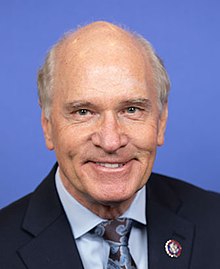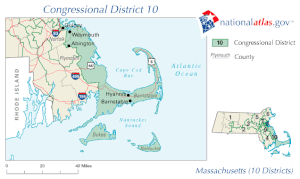A request that this article title be changed to Bill Keating is under discussion . Please do not move this article until the discussion is closed. |
Bill Keating | |
|---|---|
 | |
| Member of the U.S. House of Representatives from Massachusetts | |
| Assumed office January 3, 2011 | |
| Preceded by | Bill Delahunt |
| Constituency |
|
| Massachusetts District Attorney for the Norfolk District | |
| In office January 3,1999 –January 3,2011 | |
| Preceded by | Jeffrey Locke |
| Succeeded by | Michael Morrissey |
| Member of the Massachusetts Senate | |
| In office January 3,1985 –January 3,1999 | |
| Preceded by | Joseph Timilty |
| Succeeded by | Jo Ann Sprague |
| Constituency |
|
| Member of the Massachusetts House of Representatives | |
| In office January 3,1977 –January 3,1985 | |
| Preceded by | Laurence Buxbaum |
| Succeeded by | Marjorie Clapprood |
| Constituency |
|
| Personal details | |
| Born | William Richard Keating September 6,1952 Norwood,Massachusetts,U.S. |
| Political party | Democratic |
| Spouse | Tevis Keating |
| Children | 2 |
| Education | |
| Website | House website |
William Richard Keating (born September 6, 1952) is an American lawyer and politician serving as the U.S. representative for Massachusetts's 9th congressional district since 2013. A member of the Democratic Party, he first entered Congress in 2011, representing Massachusetts's 10th congressional district until redistricting. Keating's district includes Cape Cod and most of the South Coast. He raised his profile advocating for criminal justice issues in both houses of the Massachusetts General Court from 1977 to 1999 before becoming district attorney of Norfolk County, where he served three terms before being elected to Congress.
Contents
- Early life, education, and legal career
- Massachusetts General Court
- House of Representatives
- Senate
- District attorney
- U.S. House of Representatives
- Elections
- Tenure
- Legislation
- Committee assignments
- Caucus memberships
- Electoral history
- Personal life
- References
- External links
Raised in Sharon, Massachusetts, Keating "took a traditional route to politics", [1] attending Boston College and Suffolk University Law School. He was elected to the Massachusetts House of Representatives in 1976 at age 24 and went on to serve in the Massachusetts Senate from 1985 to 1999. He authored numerous bills signed into law concerning taxation, drug crime, and sentencing reform. His attempted overthrow of Senate President William M. Bulger in 1994 was a failure but boosted his local name recognition, which contributed to his success in the 1998 election for DA.
Keating followed the path of former Norfolk County District Attorney Bill Delahunt to the U.S. House of Representatives, winning election in 2010 to represent the 10th congressional district. In 2012, after redistricting drew his home in Quincy into the district of fellow incumbent Stephen Lynch, Keating chose to run in the redrawn 9th district, which combined the eastern portion of his old district with new territory on the South Coast taken from the 4th district long represented by Barney Frank. Keating has been reelected five times from this district. As of the 117th Congress (2021–23), he sits on the House Armed Services Committee and Foreign Affairs Committee. [2] Much of his work has focused on domestic issues central to his district, such as the fishing industry and nuclear safety.



